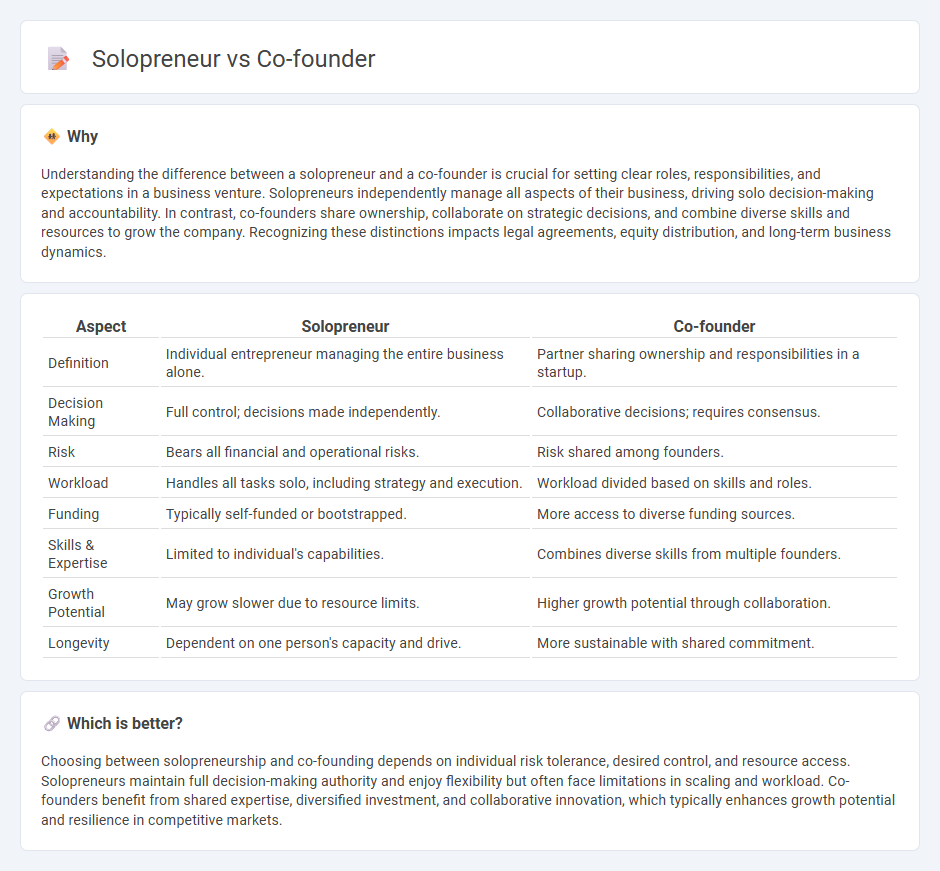
Solopreneurs independently manage all aspects of their business, leveraging personal expertise and resources for complete control and flexibility. Co-founders share responsibilities, combining diverse skills and networks to accelerate growth and innovation. Explore the key differences to determine which entrepreneurial path aligns with your goals.
Why it is important
Understanding the difference between a solopreneur and a co-founder is crucial for setting clear roles, responsibilities, and expectations in a business venture. Solopreneurs independently manage all aspects of their business, driving solo decision-making and accountability. In contrast, co-founders share ownership, collaborate on strategic decisions, and combine diverse skills and resources to grow the company. Recognizing these distinctions impacts legal agreements, equity distribution, and long-term business dynamics.
Comparison Table
| Aspect | Solopreneur | Co-founder |
|---|---|---|
| Definition | Individual entrepreneur managing the entire business alone. | Partner sharing ownership and responsibilities in a startup. |
| Decision Making | Full control; decisions made independently. | Collaborative decisions; requires consensus. |
| Risk | Bears all financial and operational risks. | Risk shared among founders. |
| Workload | Handles all tasks solo, including strategy and execution. | Workload divided based on skills and roles. |
| Funding | Typically self-funded or bootstrapped. | More access to diverse funding sources. |
| Skills & Expertise | Limited to individual's capabilities. | Combines diverse skills from multiple founders. |
| Growth Potential | May grow slower due to resource limits. | Higher growth potential through collaboration. |
| Longevity | Dependent on one person's capacity and drive. | More sustainable with shared commitment. |
Which is better?
Choosing between solopreneurship and co-founding depends on individual risk tolerance, desired control, and resource access. Solopreneurs maintain full decision-making authority and enjoy flexibility but often face limitations in scaling and workload. Co-founders benefit from shared expertise, diversified investment, and collaborative innovation, which typically enhances growth potential and resilience in competitive markets.
Connection
Solopreneurs and co-founders share the core objective of launching and growing a business, yet differ in structure and resource dynamics. A solopreneur independently manages all aspects of their business, leveraging personal skills and autonomous decision-making, while co-founders collaboratively pool complementary expertise and share responsibilities to drive innovation and scalability. Both roles are pivotal in entrepreneurship, with solopreneurs emphasizing agility and co-founders focusing on strategic partnership synergy.
Key Terms
Equity
Co-founders share equity stakes, distributing ownership and financial risk among multiple individuals, which can attract investors seeking a balanced leadership team. Solopreneurs retain 100% equity, maintaining full control but shouldering all risks and responsibilities alone. Explore the advantages and challenges of each equity structure to determine the best fit for your startup journey.
Decision-making
Co-founders share decision-making responsibilities, blending diverse expertise to drive business strategy and reduce individual risk. Solopreneurs hold sole authority, enabling swift decisions but bearing full responsibility for outcomes and pressures. Explore key decision-making dynamics between co-founders and solopreneurs to determine the best fit for your entrepreneurial journey.
Risk-sharing
Co-founders share financial, operational, and strategic risks, distributing the burden among partners and enhancing decision-making resilience. Solopreneurs bear full responsibility for risks, which can lead to increased pressure but also complete control over outcomes. Explore the advantages and challenges of risk-sharing frameworks to determine the best entrepreneurial path for your goals.
Source and External Links
Difference between Founder and Co founder - Slidebean - A co-founder is an original creator who helps the founder make the new company flourish, sharing responsibilities based on strengths, and is actively engaged in daily operations and growth.
What's The Real Difference - Founder Vs Cofounder? - The founder is typically the original creator of the company and may hold more equity or higher hierarchy, while co-founders join later to complement skills and take key roles within the executive team.
CEO and Co-Founder: Definitions and Key Differences | Indeed.com - A co-founder is a founding member who assists with leadership and vision, helping maintain company goals, morale, and culture, often holding specific executive roles within the company.
 dowidth.com
dowidth.com